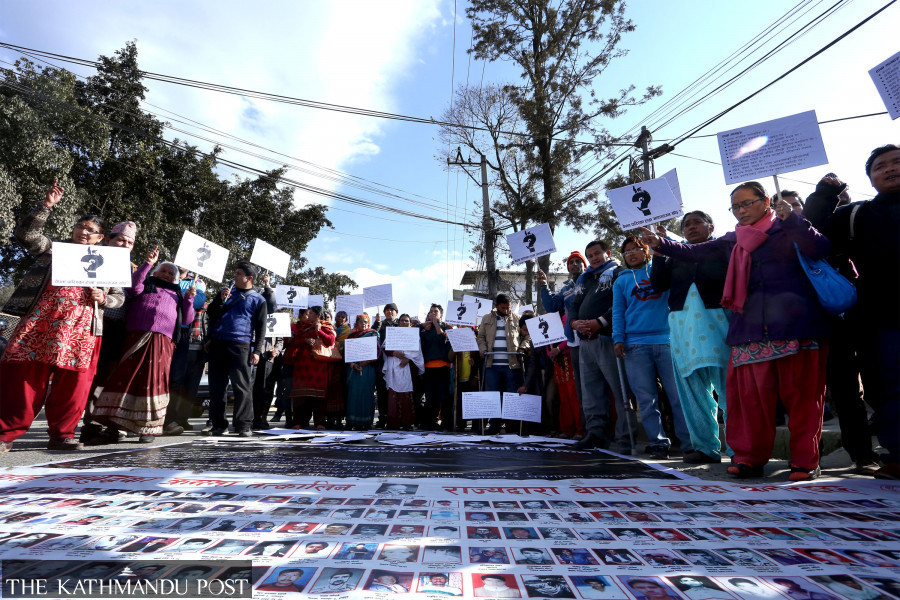National
New government, new commitment on transitional justice
Successive administrations have listed transitional justice among their top priorities but the delivery is dismal.
Binod Ghimire
One thing that has invariably found a mention in the priority lists of successive governments in the past few years is the commitment to conclude the remaining tasks of the peace process—transitional justice. Yet the process remains far from complete.
The new government’s policy priorities and minimum programme finalised on Monday also incorporates the issue as one of its 21 focus areas. It says concluding the remaining tasks of the peace process and transitional justice without further delay is among its major focus areas.
“The Enforced Disappeared Enquiry, Truth and Reconciliation Act will be amended by considering the agreement from the past,” reads one of the points. “Justice will be delivered while also ensuring reparation to the victims, thereby promoting reconciliation. Arrangements will be made to provide treatment and opportunities of employment, self-employment and rehabilitation for those injured or maimed in the conflict.”
Providing justice to the victims of atrocities committed by both sides to the conflict—the warring Maoists as well as the state forces—was one of the goals of the Comprehensive Peace Accord signed in November 2006, which marked the beginning of the peace process. However, the peace process remains incomplete as the current transitional justice process has failed to provide justice to the conflict victims.
Other than receiving the complaints and providing monetary compensation of one million rupees each to most families whose loved ones were either killed or made to disappear, nothing concrete has been done to ensure justice. The Truth and Reconciliation Commission and the Commission of Investigation on Enforced Disappeared Persons, constituted in 2015, have become defunct.
Conflict victims say they are tired of listening to the parties’ commitments; what they want is implementation of those commitments.
“No government has failed to mention transitional justice in its common minimum programme, and yet little or nothing has been done,” Suman Adhikari, founding chairperson of the Conflict Victims Common Platform, told the Post. “I am not hopeful about this government as well because the CPN (Maoist Centre), just like other parties, hasn’t shown any commitment to justice delivery despite being in almost every government since joining mainstream politics.”
The common minimum programme of the erstwhile Sher Bahadur Deuba government formed with the support of the Maoist Centre also included a pledge to conclude the peace process by expediting the transitional justice process. Despite some attempts, nothing concrete could be achieved in its one-and-a-half-year tenure. The KP Sharma Oli administration that preceded the Deuba government, of which the Maoist Centre was also a part, also did nothing concrete to conclude the long-pending task of justice delivery.
“We will trust the government the day it amends the Act [Enforced Disappearances Enquiry, Truth and Reconciliation Commission Act] in line with the Supreme Court’s verdict from 2015 and international principles,” said Adhikari, whose father was killed by the Maoist combatants in 2001.
In 2015, the apex court directed the government to amend the amnesty provisions in compliance with international principles of transitional justice and Nepal’s international obligations to human rights. Though the government in 2018 and 2022 prepared bills to amend the Act, both of them met with controversies.
The Law Ministry on July 15 last year registered an amendment bill to the Act which landed in controversy as it retained the amnesty provisions by going against the Supreme Court’s ruling. Human rights activists say raising the hope of the victims who have lost faith in the government should be the new regime’s first order of business.
They say the government must immediately come up with a detailed work plan for the amendment in the Act and for the appointment of chairpersons and members in the two commissions. Both have been vacant since July 2022.
“The same actors [the parties and their leaders] who were reluctant to expedite the transitional justice process earlier are in power again. There is little optimism among stakeholders,” Charan Prasai, a human rights activist, told the Post. “Amendment to the Act that ensures justice to the victims and the prosecution of the perpetrators involved in serious violations of human rights could nonetheless generate some hope among them.”
The amendment should be followed by appointment of the chairpersons and members in the commission after broader consultations, he said. Every stakeholder, from conflict victims to human rights defenders to human rights organisations, has long been demanding an amendment to the law, arguing that doing so is a prerequisite to advancing the transitional justice process.
Former Law Minister Govinda Sharma Bandi, who introduced the amendment bill in July last year, said there aren’t many pending issues that need to be sorted out before amending the Act. “The Act can be revised without delay based on broad consensus,” Bandi told the Post. “The Dahal government, which enjoys the support of almost all parties in Parliament, has a historic opportunity to advance transitional justice with political consensus.”




 18.12°C Kathmandu
18.12°C Kathmandu














